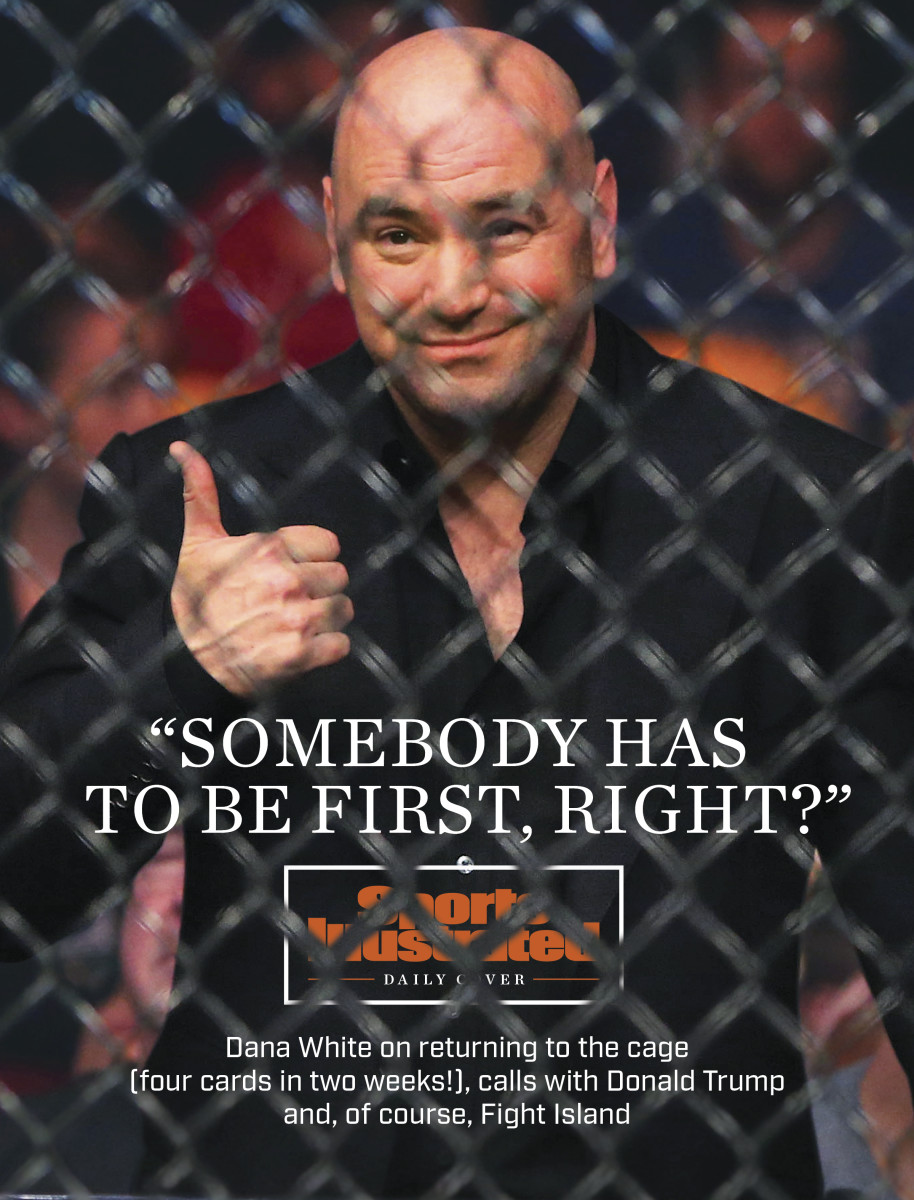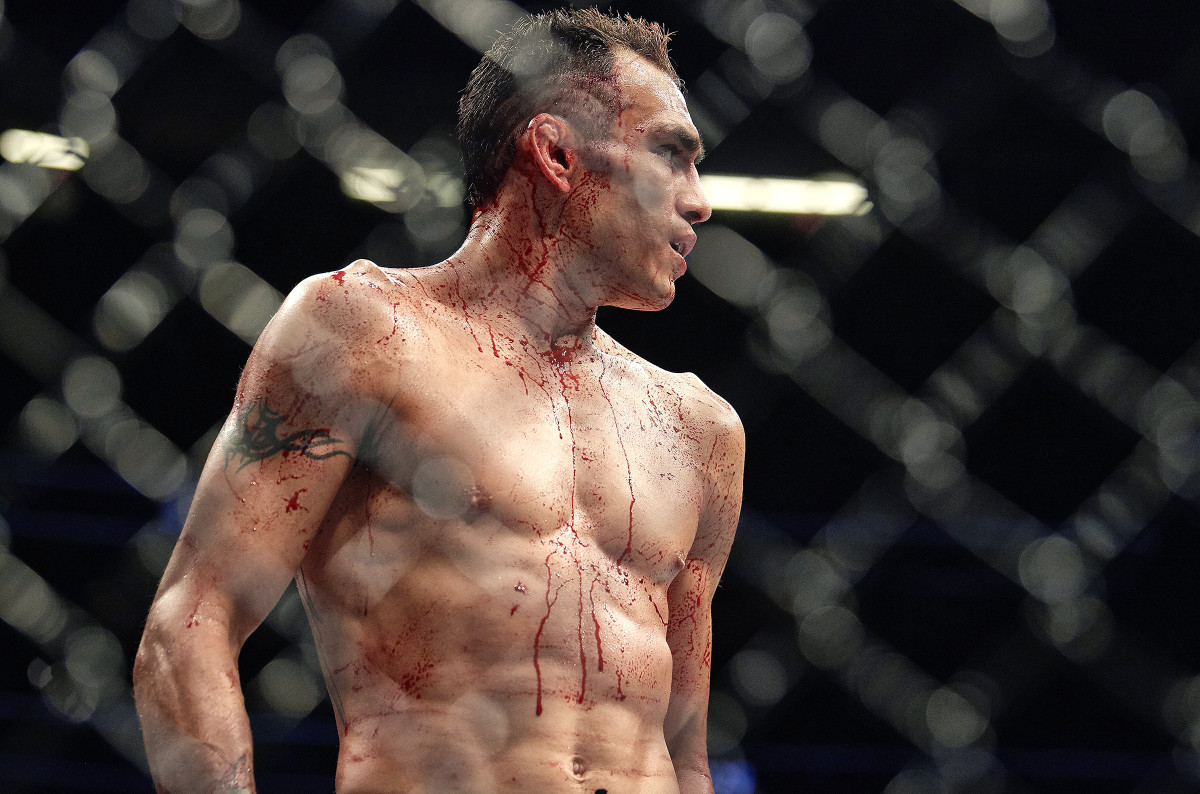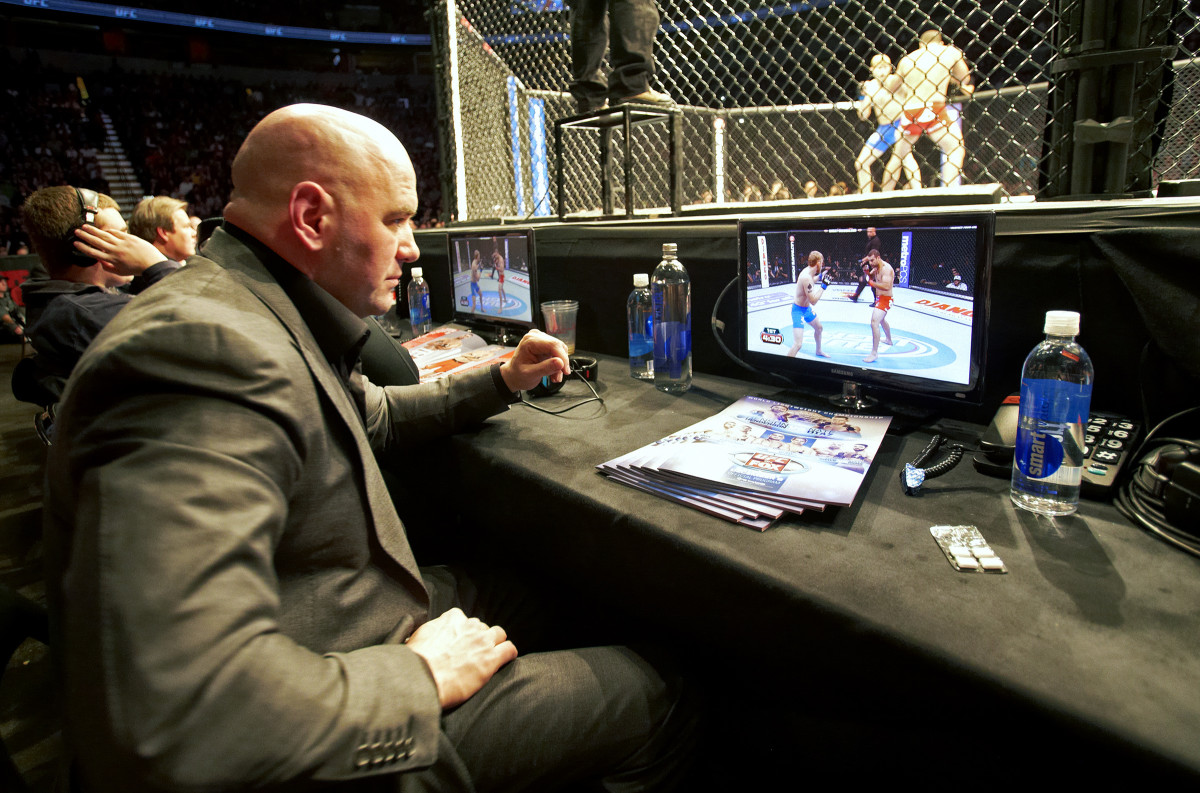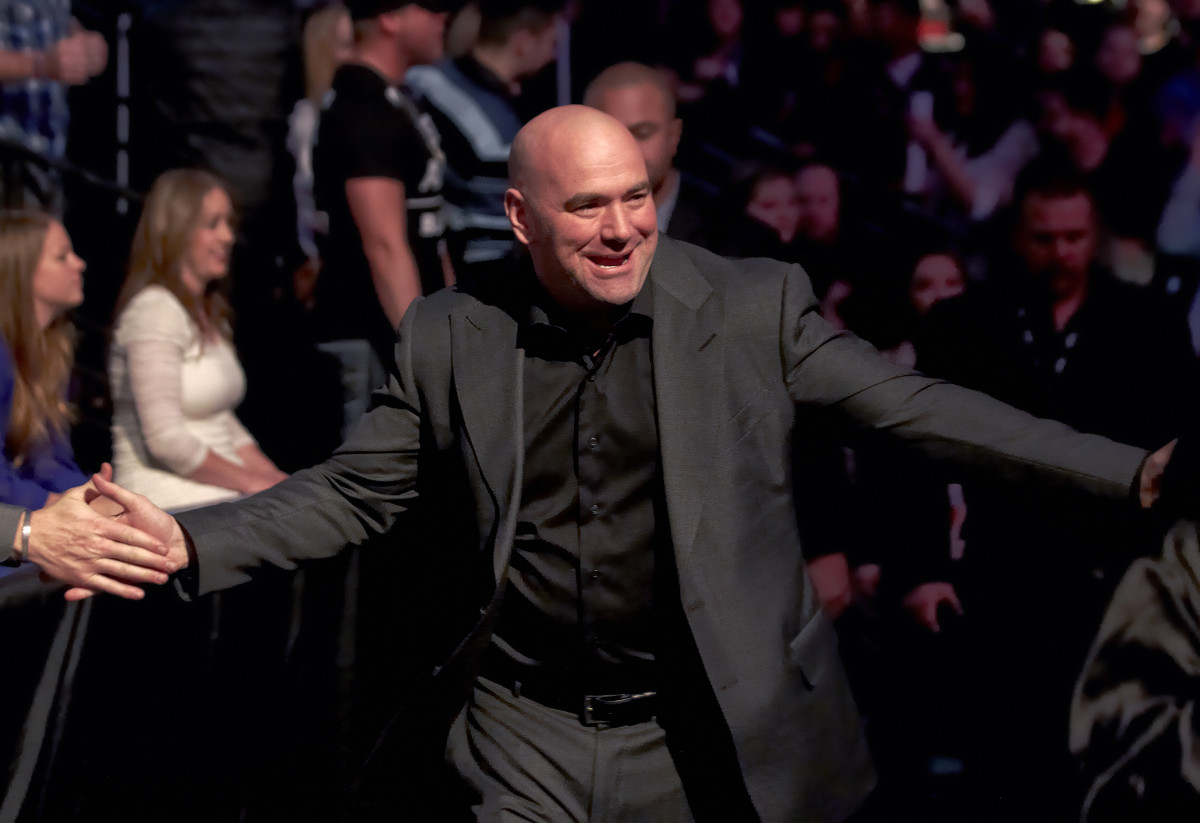Dana White: I Want to Rock. I Have an Island
Dana White is the president of the UFC, the mixed martial arts juggernaut slated to make its controversial return this Saturday at the VyStar Veterans Memorial Arena in Jacksonville. In the lead-up to UFC 249, White, 50, spoke with SI about the challenges of staging events in the middle of a global pandemic, his calls (alongside the heads of other sports leagues) with President Donald Trump and his soon-to-open, apocalyptic-sounding retreat.

SPORTS ILLUSTRATED: You’re hosting three cards in eight days, starting Saturday. What was it like trying to put on an event? And what made you comfortable doing this while some states are still under stay-at-home orders?
DANA WHITE: While everybody was f------ lying out by the pool, hanging out and doing whatever the f--- they're doing in quarantine, we were in here f------ grinding, man. Fighting crazy wars every day to put on this first event. We pulled it off. We were gonna be able to hold this thing earlier, and they asked us to stand down. … Now we're going Saturday, Wednesday, Saturday. And I don't think I've told anybody this yet: We're gonna come back to Vegas and put on a fight May 23.
Four cards between May 9 and May 23? Could that really be safe?
DW: Then we'll be on our regular schedule again and we’ll open up Fight Island, start doing international fights. Any fight that would've been in, like, Brazil or Canada will be on Fight Island. … Listen, for a lot of these sports organizations, it’s: We need to go overboard on safety now. We go overboard on safety every weekend. We always have to figure out how we can make the next event as safe as possible for our fighters, the fans, our employees. … This isn’t anything new for us. We have relationships with labs all over the country, hospitals and doctors. The coronavirus didn't make us start worrying about f------ safety. We've been doing it for 20 years.
But why come back now?
DW: I love the fact that these guys in Jacksonville have been so receptive and helpful. Instead of fighting us, they worked with us and figured out how we could pull it off safely. Somebody has to be first, right? Eventually. You just can't hide forever. Who gets to determine how long we go without sports? It's a really weird situation, in a weird time.

Somebody does have to be first. Why you?
DW: It's not even, “Oh, I have to be the first one.” I didn't want to stop putting on events at all. I wanted to keep right on going—we'll figure this thing out. If this thing is that deadly, it's gonna get us no matter where we hide or what we do. … All the rules and all the plans, I actually found it fun [figuring out]. I like chaos, man. I like trying to figure things out. I'm into that s---. I'm a weirdo.
You saw it as a challenge?
DW: I like the challenge. I like figuring out the puzzle. Every day we'd come to work and go, “All right, that all changed. Let's try this.” I felt like we didn't need to [stop] at all. If I could've figured out the fight we were supposed to do a little sooner, we could've kept this thing rolling the whole time, and done it safely. Let's put it this way: I know a lot more than you know about what's going on with a lot of things. We could've gone straight through without stopping and kept everybody safe.
You have consistently maintained that.
DW: I know it sounds reckless, but it was far from reckless. We had everything planned out. This thing would've been very, very safe and doable. Listen, there's no guarantee. There's nowhere I can say it's 100%. Nothing is 100%, especially when you're dealing with, like, a virus. Staying home every day isn't gonna guarantee anything, either. A few weeks before [U.S. sports shut down] we had just done an event in Brazil [Fight Night Brasilia, on March 14]. It looked good on TV. They still had restaurants open in Brazil; people were still going out. My staff was down there hanging out. Right after that event was when everything shut down. They were shutting down in Brazil.
Yes, "reckless" is a word people use around you a lot—but you do have a long track record of making mixed martial arts safer in the UFC. Do you feel like you’ve been mischaracterized as some sort of COVID-19 denier?
DW: One hundred percent. Absolutely. That's what I'm always painted as. … Corporate greed. … I'm a f------ money monger. I'm this and that. I'm like: Do you f------ people understand that I don't have to do this? I could've f------ retired five years ago. I'm not doing this because I need the money. I haven't laid off one employee. Everybody is getting paid. Fighters that were supposed to fight: If they didn't get their fight, they're getting some money, too. It isn't like we're about to go bankrupt over here, and if I don't pull off this fight on May 9 we're f---ed.
The city where you live, Las Vegas, has pretty much shut down. Everyone got laid off.
DW: Probably 85% of the city. It's pretty crazy. In my lifetime, not under any circumstances did I ever think I'd see the Las Vegas strip shut down. Casinos are open on Christmas, you know? A disaster happens somewhere else, Vegas does not shut down. Now? Day One, I said: We’re not laying anybody off. We’re not cutting anybody’s salaries.
Have you paid attention to what other sports leagues are doing, or borrowed strategy from them?
DW: A lot of them are justified, but a lot of them were caving to the media [in closing down]. They didn't want any bad press. You're telling me people couldn't go out and golf with no crowds? C’mon. That's ridiculous. They caved to the media pressure. People couldn't race cars? Maybe there's more to car racing than I understand? Are there too many people together in the pit? But I imagine they could've raced cars, too, with no crowd.
Why didn’t you cave?
DW: I've been through stuff that other sports organizations haven't. So, I think it was easier for me to keep battling to put on an event. All these other organizations, they crumble as soon as there's any type of negativity.

You were on the calls with President Trump. What can you say about those?
DW: Listen, everybody wants to come back. The calls were a very, very cool thing to be a part of. There've been three calls so far, and I think they were all handled really well. The President asked a lot of really great questions. … He opened it up for everybody to give their two cents on what's going on, some of the problems we're gonna face and some of the solutions.
And did the tenor change from the first call to the third?
DW: It didn't sound like it to me. Getting off the last call, I felt like: Some of these bigger leagues are literally gonna take the year off.
You’ll be the first back, in Jacksonville. You’re also building a locale just for UFC fights. You’ve consistently said you won’t yet reveal the location of Fight Island, but could you paint a picture for me?
DW: The infrastructure is being put in now. This place is literally going to be a UFC Fight Island—just like our training facility in Las Vegas, with the UFC Apex next door that can host concerts, comedy, stuff like that. That's what we're doing on the island. We're designing and building it for people to come in and train, with rooms and things like that. The whole island will be laid out just for fighting. … Everybody has this image in their mind of Fight Island, like something out of a video game. It will be a lot more modern than that. There won't be tiki torches or any of that s---. … We’re gonna use it a lot until the world gets normal again. We're gonna need it for our international fights—a place where people can fly in and out easily, without needing a bunch of visas and red tape.
What precautions have you put in place for this next event, UFC 249?
DW: I don't wanna die. I don’t have a f------ death wish. I'm not out there trying to kill myself. And I don't want to kill any of my employees or their families. It's not like we're running around with no plan. The thing is: Let's find solutions. How do we get back as close to normal as we could possibly get? A 15,000- or 20,000-seat arena with no fans isn't normal. A lot of things aren't normal going into this event. But we're trying to figure out how to make it as safe as possible. … Let me put it this way: We're gonna go so overboard making sure everybody is healthy and safe that I just don't see how we can possibly f--- this up. … My fighters and my employees have been told: If you're not comfortable coming back to work, you don't have to. It's not like we're in some dire financial situation, like that's why I'm pushing this.

Some leagues have said they might pipe in crowd noise. Would you do that?
DW: We're still gonna play music. I'm still bringing in AL3, our DJ, for the event. But there will be no fans and no crowd noise. I thought about pumping in crowd noise. What if we did, like, a virtual crowd? I thought of all that s---. Then I'm like: Eh, stop it. It would lose some authenticity. I don’t want it to be like one of those old sitcoms, with a laugh track.
So what do you think it will be like?
DW: It's definitely going to be weird. The reaction and the noise when guys walk in and the fans are all over them—it's one of the coolest things about the sport. But it's something we're gonna have to live without for a minute, until we get this thing figured out.
Do you think you’ll be criticized for staging this many events, this quickly?
DW: Depends what channel you listen to. Completely different information. Don't even go on the internet, it's all over the map. You have people saying if you go here or there you're gonna get this thing and you're gonna die. You have other people saying it's a conspiracy to get rid of Trump. That it's man-made. We don't really know that much more about the coronavirus than we did four months ago.
This interview has been edited and condensed for clarity.
